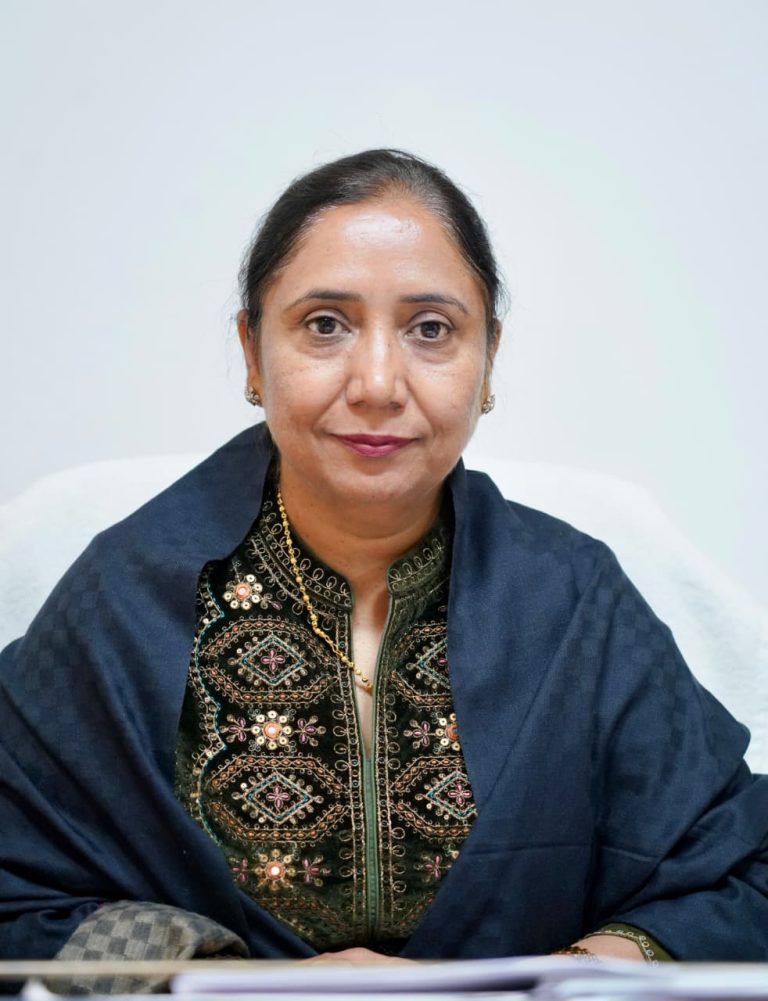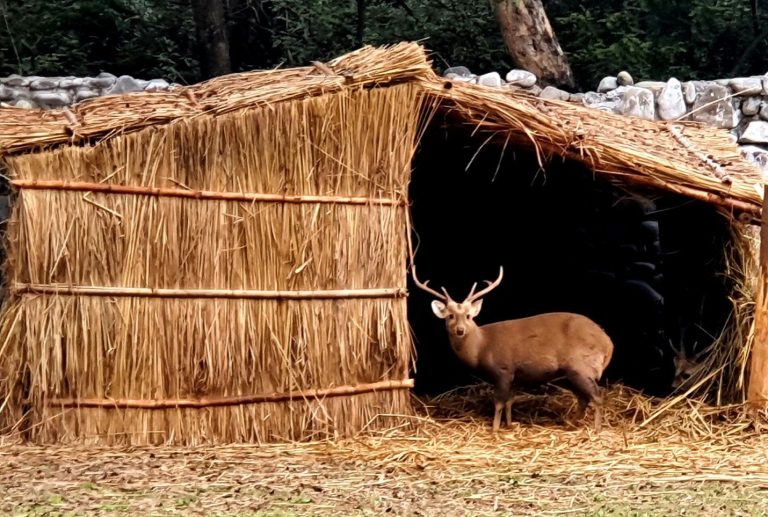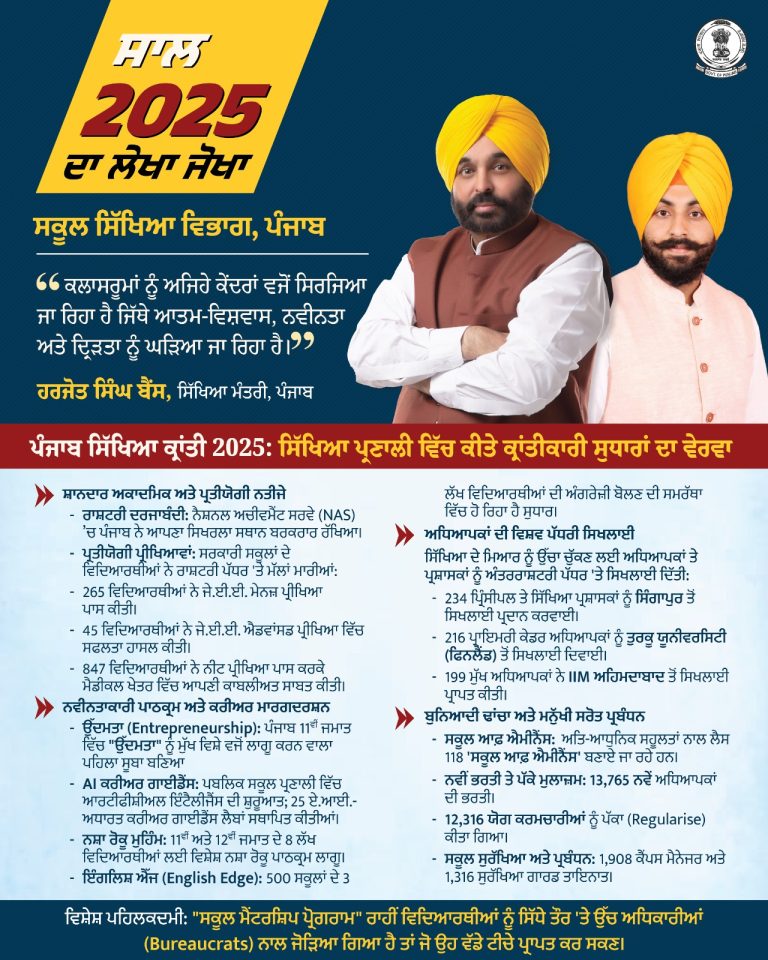
ਪੰਜਾਬ ਦੇ ਮੁੱਖ ਮੰਤਰੀ ਭਗਵੰਤ ਸਿੰਘ ਮਾਨ ਨੂੰ ਮੋਹਾਲੀ ਦੇ ਇਕ ਨਿਜੀ ਹਸਪਤਾਲ ਤੋਂ ਛੁੱਟੀ ਮਿਲ ਗਈ ਹੈ। ਭਗਵੰਤ ਮਾਨ 5 ਸਤੰਬਰ ਤੋਂ ਹਸਪਤਾਲ ਵਿੱਚ ਦਾਖਲ ਸਨ।
Chandigarh, September 8: In a historic decision, the Punjab Cabinet approved a measure named ‘Jehda Khet, Ohdi Ret.’ The Chief Minister, Bhagwant Singh Mann, led this decision on Monday. This measure enables farmers to remove sand and silt accumulated in their fields due to floods. They can sell the sand and silt if they desire.
A decision to this effect was taken by the Council of Ministers in its meeting held here under the chairmanship of the Chief Minister, who joined it virtually from Fortis hospital, where he was undergoing treatment.
Cabinet ; villages will be allowed to remove sand from their land without any permit
Disclosing this here today a spokesperson of the Chief Minister’s Office said that due to the floods, sand and silt have accumulated in several fields at the inundated villages. Therefore, in a major reprieve to the farmers, it has been decided that farmers will be allowed to remove sand and silt from their own fields. They may sell it if they wish. Under the policy of “Jisda Khet, Usda Rait” (One who owns the land, owns the sand), farmers in all flood-affected villages will be allowed to remove sand from their land without any permit by December 31.
The removal of silt/sand/river borne material from agricultural land by way of this “one time measure” shall not be considered mining of mineral. The concerned Deputy Commissioner shall declare the list of affected villages in a district. In these villages, the operation of removal and lifting of deposited silt, sand, and river borne material may be done by the affected farmers, cultivators, or a group of farmers affected by flood material deposition. To mitigate the impact of the recent floods, all District Mining Officers as well as District Level and Sub-Divisional Level Monitoring Committees shall facilitate the removal and lifting of such silt/sand/river borne material deposits on the affected cultivable lands, without disturbance of the original ground surface by way of pits, trenches or otherwise.
Further dwelling on agenda of crop damage, the Cabinet decided that the Punjab government will provide compensation of up to Rs 20,000 per acre, which is not the highest in the history of Punjab, but it is the highest in the entire country. This is in consonance with the commitment of the state government to bail out the farmers of Punjab in this hour of grave crisis.
Cabinet ; GIVES NOD TO AMEND PUNJAB TOWN IMPROVEMENT ACT 1922
The Cabinet approved Amendment to the Punjab Town Improvement Act, 1922 to enable the urban local bodies of the State to utilize funds of the Improvement Trusts through the Municipal Development Fund, which was established by the State Government to undertake urban infrastructure works for which allocation is received from the State Budget every year. In order to enable utilization of funds received by the Improvement Trusts through disposal of their properties for undertaking urban infrastructure works by the urban local bodies of the State, clause 69B has been added in the act thereby stipulating that such portion of money, as may be prescribed, received by the Trust from the disposal of lands, buildings and other moveable or immovable properties shall be transferred towards the Municipal Development Fund.
GIVES PROSECUTION SANCTION AGAINST BIKRAM MAJITHIA
The Cabinet also granted prosecution sanction against former Punjab Minister Bikram Singh Majithia u/s 19 of Prevention of Corruption Act 1988. As the Advocate General (AG) of Punjab advised, the matter regarding granting prosecution sanction of the former Minister needs to be discussed first in the Council of Ministers. After that, it will be sent to the Governor to pass a formal order.
NOD TO CUSTOM MILLING POLICY FOR KMS 2025-26
The Cabinet also gave signal to the Custom Milling Policy for Kharif Marketing Season 2025-26 starting from September 16, 2025 and the procurement of paddy would be completed up to November 30, 2025. As per the provisions of “The Punjab Custom Milling Policy for Kharif 2025-26”, the Rice Mills will be linked online to the mandis in time by the Department. The paddy allocation to Rice Millers under RO scheme will be automatic through an online portal. The paddy will be stored at the eligible rice mills as per the provisions of Policy and Agreement executed between the State agencies and the Rice Millers. The proposal in “The Punjab Custom Milling Policy for Kharif 2025-26” states that rice millers will deliver the due rice. This delivery is for the paddy stored up to March 31, 2026. The delivery must adhere to the Policy and Agreement.
CONSENT TO AMEND PUNJAB STATE MINOR MINERAL POLICY 2023
With the aim to allot the mines in a more efficient manner, generate more revenue and increase more supply of material, the Cabinet gave nod to make amendments in Punjab State Minor Mineral Policy, 2023 and relevant rules of Punjab Minor Minerals Rules, 2013. These modifications are related to Auction modalities, Grant of Mining Rights, and Period of Concession. They also include Concession Amount and Payment of Security deposit. Additionally, there is a change in responsibility for seeking Environment clearance. The concept of ‘Dead Rent’ is also introduced. These changes are reflected both in the Punjab State Minor Mineral Policy 2023 and Punjab Minor Minerals Rules 2013.
These new rules/ modifications will be added/ substituted in the existing Punjab State Minor Mineral Policy, 2023 and Punjab Minor Minerals Rules 2013. Furthermore, the Rates of Royalty under Schedule need to be enhanced. This enhancement is necessary to align the rates with the Punjab State Minor Mineral (Amendment) Policy dated 30.04.2025. The State Geologist has powers to hear appeals against assessment orders as per Rule 87. Currently, the post is empty. It is proposed to empower the Government to delegate the powers to other officers in the Department. This delegation is needed so that appellate work does not suffer.
GIVES APPROVAL TO FORM SMET
The Cabinet gave approval to constitute Punjab State Mineral Exploration Trust (SMET). This trust will oversee the planned development of the mineral resources. It will manage their exploration in the State. The trust will prepare vision and mission plans. It will create a master plan for exploration and fund the exploration of forest areas. The trust will facilitate surveys and organize capacity building programs. It will undertake R&D and strengthen and upgrade the Department laboratory. The trust will appoint officers and technical persons and develop the State Mineral Directory. It will introduce innovation and provide logistics support for exploration projects. The trust will monitor mining and related activities through technology and others.
CONCURRENCE TO REGULARISE SERVICES OF 1007 NON TEACHING STAFF UNDER SSA
The Cabinet also gave its concurrence to create 1007 posts in the School Education department. It approved the Regularization of Services of Non-Teaching staff under Samagra Shiksha Abhiyaan (SSA) against these posts. This will pave the way for the long-awaited regularization for non-teaching SSA employees. It will also strengthen the administrative functioning of the education department. Integrating experienced personnel in the Government structure will avoid further litigation.
GIVES NOD TO AMEND PUNJAB EDUCATION SERVICE RULES 2018
The Cabinet also gave nod to amend Punjab Education Service Rules 2018 to further streamline the process of promotions in the Education department. As per the existing rule of 2018 there is no promotion avenue for some of the cadres, by amending these rules new promotion avenues have been opened for PTI (Elementary), Pre Primary Teachers, Special Educator Teachers (Secondary) and Special Educator Teacher (Elementary) and
Vocational Masters. By this amendment approx. 1500 teachers shall be benefited. This amendment shall make way for fresh recruitments and open job opportunities for aspiring candidates.
CABINET APPROVES PUNJAB COMMUNITY SERVICE GUIDELINES 2025
The Cabinet also gave nod to Punjab Community Service Guidelines 2025. This aims to bring uniformity across the District Courts of the States of Punjab, Haryana and UT Chandigarh. It seeks effective implementation of the three new criminal laws. These laws allow for a sentence of community service under Section 23(2) of BNSS 2023. They also allow it under Section 18(1)(c) of the Juvenile Justice Act 2015, or other laws throughout the country.
PAY PROTECTION ON MERGER OF RMOs FROM ZILA PARISHAD TO HEALTH AND FAMILY WELFARE DEPARTMENT APPROVED
The Cabinet also gave its concurrence to ensure Pay Protection on Transfer of Rural Medical Officers. These officers work under Zila Parishad. They will be transferred or merged into the Department of Health and Family Welfare. These medical officers will be allowed the benefits of pay protection after their transfer or merger into the Department of Health and Family Welfare. However, the benefit of previous service will not be admissible for any other purpose except pay protection.
GIVES NOD TO FORMULATE POLICY TO HONOR GOVERNMENT DOCTORS
The Cabinet also approved the formulation of a policy. This policy aims to honour Government Doctors working under the Department of Health & Family Welfare, Punjab for their excellent services. This step is aimed at recognising the services of the doctors and encouraging them to further perform their duties efficiently. All doctors, regular and on-contract with the department will be eligible in their respective categories
GIVES NOD TO CREATE 1600 NEW NGO POSTS IN PUNJAB POLICE
The Cabinet approved the creation of 1600 new NGO’s posts (ASI, SI & Inspector) in the District Cadre of Punjab Police. This aims to strengthen police stations. This will ensure effective investigations and address emerging challenges, particularly related to NDPS cases and other organized crimes. As per decision 1600 new posts of NGOs (Inspr.-150, SI-450 & ASI-1000) in the District Cadre of Punjab Police will be created and filled by way of promotion and to fill up 1600 posts of Constables created as resultant vacancies. This decision has been taken while keeping in view the police department’s need for adequate on-ground deployment. This ensures effective investigation and supervision of the NDPS Act, heinous crime cases, cybercrime, and economic offences in Punjab.



